A new CardRatings.com survey found one item on the holiday shopping lists of many Americans that may surprise you.
Nearly one in four Americans plans to get a new credit card this holiday season. In particular, younger adults are especially likely to be in the market for a new credit card.
Now with all the other holiday activities going on, why are so many people picking this time of year to look for a new credit card?
Well, it makes sense. The holiday season represents a peak in credit card spending and balances. So before using credit so extensively, why not shop around to make sure you have the best possible terms?
Looking for better credit terms is just one way you can shop more cost-effectively this holiday season. The CardRatings.com survey found other ways the financially successful spend responsibly at this time of year.
1. Never stop shopping for better credit card deals
Twenty-four percent of respondents said they expected to open a new credit card account this holiday season. Those who said they planned to get a new card tend to be younger than those who said they didn’t.
The average age of people who said they expected to open a new credit card this holiday season was 37. Those who said they did not plan to get a new card had an average age of just under 49 years.
This is understandable. As people go on in life, they become set in their ways. More and more, they tend to stick with the service providers they’ve been with for years. But is this wise?
Here are some reasons why it makes sense to continue to look for better credit card terms, no matter how long you’ve had your current accounts:
- Your credit card terms – including interest rates, fees and rewards – may change at any time. What was a great deal when you first opened the account might not be as favorable now.
- The market is always changing. Even if your credit card terms haven’t changed, the deals available from other cards might have. It’s a competitive field, but that only works to your advantage if you keep an eye on the market.
- Your credit history may have changed. People’s credit scores change over time, and the way credit card companies reward or punish those changes varies. From time to time, it pays to see which credit card company has the best terms for someone with your credit history.
- Different spending habits call for different types of cards. If you regularly carry a balance on your card, a low interest rate might be the most important thing to look for. If you spend frequently but pay off your balances promptly, a stronger rewards program might be the best deal. Since your spending and payment habits may evolve over time, take fresh look now and then at what represents the best deal for your type of credit card usage. At the least, it’s a good idea to assess your credit card needs at least once per year or any time you have a significant lifestyle change like a change to marital status, a new baby or a job change.
During the holiday season, you may use your credit card more than at any other time of the year. You may also carry a balance on your account for months as a result of your holiday shopping. With that being the case, leading into the holiday season might be the ideal time to shop for a better credit card deal.
2. If you’ve got it, flaunt it: Take advantage of a good credit score
Keeping your personal finances in good shape doesn’t mean never borrowing. As a matter of fact, people with good credit scores tend to make regular use of their credit cards.
When the survey asked consumers how they planned to pay for most of their holiday gift purchases, people with strong credit scores were most likely to say credit cards would be their primary method of payment.
The chart below groups respondents from those with poor credit on the left to those with excellent credit on the right. The height of the bars shows the percentage of respondents in each group that said they’d use credit cards to pay for most of their holiday gift purchases.
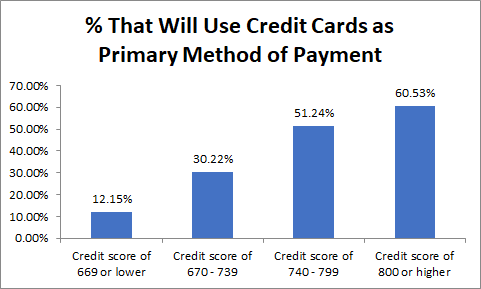
A good credit score makes credit cards a more cost-effective payment option. In turn, using those cards regularly can further strengthen your score. The key is not just using credit regularly, but being responsible with how you do it; namely, paying your bill on time every billing cycle and, if at all possible, paying off your balance in full each month as well.
3. Make credit work for you
The chart in the previous section shows that paying for things with a credit card can be a sign of financial strength, not weakness. What matters is using credit in a way that works to your advantage.
For example, it would be wrong to think that people with high incomes don’t use credit. They certainly do, but they know how to use it without paying for it. They do this by paying their credit card balances in full every billing cycle, so they don’t incur interest expenses.
The chart below compares the lowest income group in the survey with the highest. The height of the bars shows how likely each group is to pay their credit card bills off in full at the end of the first cycle after the holiday shopping season.
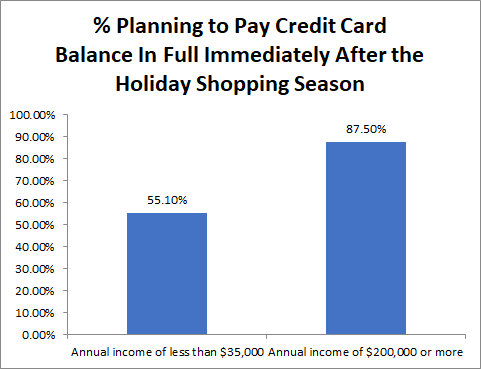
By being much more likely to pay their credit cards off in full each cycle, the higher-income group generally avoids interest charges. That’s an example of how the rich get richer, but you don’t have to be rich to use credit this way. Just spend within your means so you can pay off your balance before it starts costing you.
Prompt payment of credit card balances is also a way people with excellent credit scores maintain those scores by avoiding unnecessary interest expenses. The chart below compares how likely people with low credit scores (shown on the left) and those with high credit scores (shown on the right) are to pay off their credit card balances by the end of the first cycle after holiday shopping.
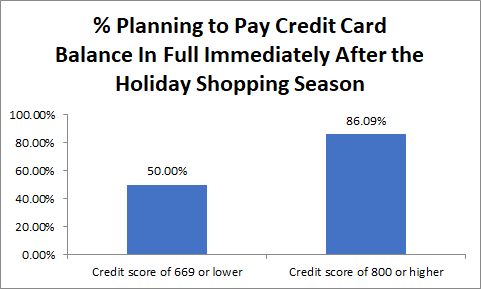
The key difference between people in great financial shape and those who are struggling isn’t whether they use credit. It’s a matter of how they use it. Paying off your balance in time to avoid interest charges is one way you can make credit work for you.
4. The early birds may get the best holiday deals
Waiting for the last minute to do your holiday shopping puts more deadline pressure on you. That pressure might cause you to settle for less than the best deals.
The survey showed that people with low credit scores are twice as likely as those with the highest scores to wait untill December to do their holiday shopping. This is shown in the chart below.
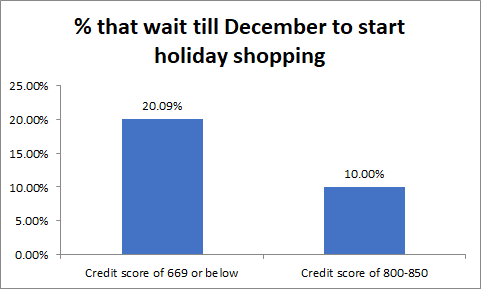
Besides taking advantage of Black Friday and Cyber Monday deals in November, try shopping for gifts throughout the year, so you can take advantage of good deals whenever you see them.
In addition to giving you more time to be selective, shopping earlier might make it easier to stay on budget. If you wait untill the last minute, you might become desperate to get your shopping done even if it means paying a little extra. Taking your time throughout the year allows you to avoid making rushed decisions.
5. Don’t feel pressured to give more
Along with rushed decisions, another holiday budget buster is giving into the pressure to spend more on holiday shopping. The survey found that more than a third (36%) of respondents felt pressure to spend more on holiday gifts than they can comfortably afford.
It’s only natural. Everyone wants to feel generous around the holidays (with the possible exception so Ebeneezer Scrooge, and even he turned around). Still, you need to budget for how generous you can afford to be, and stick with that budget.
➤ RELATED CONTENT: Women are smarter holiday shoppers, but feel more pressure
People who are in good financial shape tend to follow this kind of discipline. As the chart below shows, people with strong credit ratings are far less likely to feel pressure to spend more than they can afford on holiday gifts.
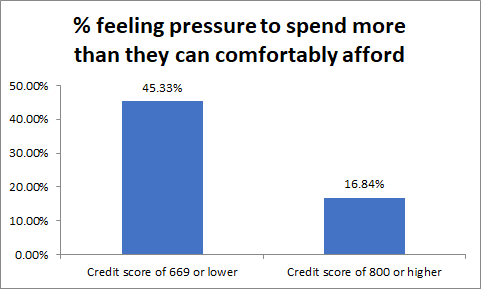
Using credit responsibly doesn’t have to mean being stingy. In fact, good credit habits can help you afford to spend more on holiday gifts.
Survey respondents who said they paid their credit cards off in full every cycle estimated that they spent an average total of $1,012.31 on holiday gifts, compared to $892.96 for respondents who regularly carried a credit card balance.
Paying your balance off on time allows you to avoid interest charges. It also helps you keep your credit score in shape, so you can qualify for lower credit card rates when you do have to pay interest. Either way, responsible use of credit helps more of your money go towards the gifts you buy for your loved ones rather than toward paying interest to credit card companies.
About the Survey
Data used in the above article come from a survey of 1,001 consumers conducted by Op4G for CardRatings.com. Survey design and data analysis was done by CardRatings.com.


